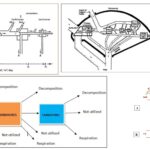Anaerobic Respiration 10 Views 1 Answers
Sourav PanLv 9August 19, 2024
What does anaerobic mean?
What does anaerobic mean?
Please login to save the post
Please login to submit an answer.
Sourav PanLv 9May 15, 2025
Anaerobic refers to processes or conditions that occur in the absence of oxygen. In biological contexts, anaerobic processes are those that do not require oxygen for their metabolic activities. These can include:
- Anaerobic Respiration: A type of respiration where oxygen is not used as the final electron acceptor. Instead, other molecules, such as nitrate, sulfate, or carbon dioxide, are used. This process generates energy, but usually less efficiently compared to aerobic respiration.
- Fermentation: A form of anaerobic respiration where organic molecules (like glucose) are broken down to produce energy, with end products such as ethanol and carbon dioxide (in yeast) or lactic acid (in muscles and certain bacteria).
- Anaerobic Environments: Environments where oxygen is absent or present in very low amounts, such as deep soil layers, waterlogged soils, and the intestines of animals.
0
0 likes
- Share on Facebook
- Share on Twitter
- Share on LinkedIn
0 found this helpful out of 0 votes
Helpful: 0%
Helpful: 0%
Was this page helpful?




